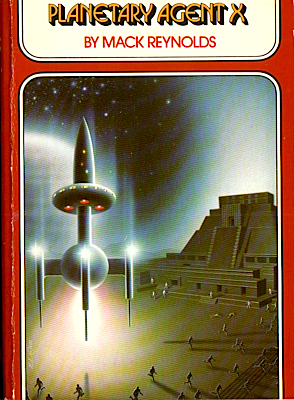“Oh, I don’t know,” Tog mused. “I don’t have much regard for Industrial Feudalism, myself. It starts off with a bang, but tends to go sterile.”
“Industrial feudalism,” he said indignantly. “What do you mean? The government is a constitutional monarchy with the king merely a powerless symbol. The standard of living is high. Elections are honest and democratic. They’ve got a three-party system…”
“Which is largely phony,” Tog interrupted. “You’ve got to do some reading between the lines, especially when the books you’re reading are turned out by the industrial feudalistic publishing companies in Avalon.”
“What’s this industrial feudalism you keep talking about? Avalon has a system of free enterprise.”
“A gobbledygook term,” Tog said. “Industrial feudalism is a socio-economic system that develops when industrial wealth is concentrated into the hands of a comparatively few families. It finally gets to the point of a closed circle all but impossible to break into. These industrial feudalistic families become so powerful that only in rare instances can anyone lift himself into their society. They dominate every field, including the so-called labor unions, which amount to one of the biggest businesses of all. With their unlimited resources they even own every means of dispensing information.”
“You mean,” Ronny argued, “that on Avalon you can’t start up a newspaper of your own and say whatever you wish?”
“Certainly you can, theoretically. If you have the resources. Unfortunately, such enterprises become increasingly expensive to start. Or you could start a radio, TV or Tri-D station—if you had the resources. However, even if you overcame all your handicaps and your newspaper or broadcasting station became a success, the industrial feudalistic families in control of Avalon’s publishing and broadcasting fields have the endless resources to buy you out, or squeeze you out, by one nasty means or another.”
Ronny snorted. “Well, the people must be satisfied or they’d vote some fundamental changes.”
Tog nodded. “They’re satisfied, and no wonder. Since childhood every means of forming their opinions has been in the hands of industrial feudalistic families—including the schools.”
“You mean the schools are private?”
“No, they don’t have to be. The government is completely dominated by the fifty or so families which for all practical purposes own Avalon. That includes the schools. Some of the higher institutions of learning are private, but they, too, are largely dependent upon grants from the families.”
Ronny was irritated by her know it all air. He tapped the book he’d been reading with a finger. “They don’t control the government. Avalon’s got a three-party system. Any time the people don’t like the government, they can vote in an alternative.”
“That’s an optical illusion. There are three parties, but each is dominated by the fifty families, and election laws are such that for all practical purposes it’s impossible to start another party. Theoretically it’s possible; actually it isn’t. The voters can vary back and forth between the three political parties but it doesn’t make any difference which one they elect. They all stand for the same thing—a continuation of the status quo.”
“Then you claim it isn’t democracy at all?”
Tog sighed. “That’s a much abused word. Actually, pure democracy is seldom seen…”
| 